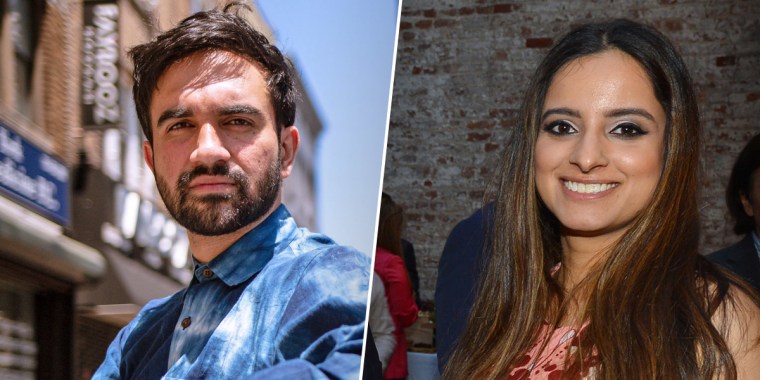Two Indian Americans were elected to the New York state Assembly on Tuesday — making them the first South Asians voted into the lower house of the state Legislature.
Both Democrats from Queens, Jenifer Rajkumar won 66 percent of votes and Zohran Mamdani won 72 percent.
Mamdani, 29, who will represent Astoria, a multiethnic neighborhood in Queens, beat incumbent Aravella Simotas in the Democratic primary this year and faced no Republican opponent in the general election. Rajkumar, 38, who will represent parts of Queens that are largely made up of immigrants, won her primary in the state election cycle and defeated Republican Giovanni Perna on Tuesday.
The 2010 census reported that more than 300,000 South Asians lived in New York City — about a third of the total Asian American population — but the community hasn't had an elected desi representative before this year.
Mamdani, a housing advocate, is among several progressive, Democratic Socialists of America-backed newcomers in New York politics who have unseated entrenched incumbents. Mamdani, an Indian American who was born and raised in Uganda and refers to himself as Indian Ugandan, is the son of the renowned filmmaker Mira Nair. He also used to work as a foreclosure housing counselor at Chhaya, an advocacy group based in Queens.
Rajkumar, who won her primary over Democratic incumbent Michael Miller — who repeatedly voted against legalizing same sex-marriage — is an Indian American lawyer who previously ran for the Assembly in 2016. She previously served as Gov. Andrew Cuomo's director of immigration affairs and as special counsel for the New York State Department. Early in the year, Rep. Ro Khanna, D-Calif. — who is also Indian American — endorsed her.
Only one other person of Indian descent has been elected to any government office in New York before Mamdani and Rajkumar: Kevin Thomas, who was elected to the state Senate from Long Island in 2018. Thomas, who along with John Liu became the first Asian American state senators, has advocated for official recognition of the Hindu festival Holi and has invited Muslim religious leaders to offer the Senate's opening prayer.
Queens is home to the largest concentration of South Asians in New York City, and yet no candidate has ever been elected from the heavily South Asian neighborhoods of Jackson Heights or Jamaica. The city's 24th Assembly District is 26 percent South Asian, but it hasn't yielded a single South Asian victory even though several candidates have run in the past.
In addition to Mamdani and Rajkumar, other South Asians in the state ran for office this year. Democrat Suraj Patel ran an uphill contest for Congress against four-term incumbent Carolyn Maloney, who represents the Upper East Side, and lost in what was among the most hotly fought primaries in the city.
Gerrymandering has been a major obstacle to South Asians' getting elected in New York, said John Albert, a founding board member of Taking Our Seat, a Queens-based organization working to increase South Asian political representation. Despite its large numbers, the community dominates no political district.
Rajkumar said, "In Queens, district lines were drawn such that South Asian areas were cut into different parts."
Rajkumar said she believes she won because her campaign cut across community and ideological lines. "We won big not only in the South Asian community but in Latino, Irish and Italian neighborhoods," she said.
Albert said having Rajkumar and Mamdani in office during the redistricting process will be a boon.
"They will both have a seat at the table as legislative districts are drawn, impacting district lines for a decade," he said. "I hope they will use their position to pay close attention to areas outside of their own district where South Asian votes may be diluted through gerrymandering."
Mamdani, who won his primary by 300 votes, ascribed the lack of South Asians in the Assembly to "racism ... what else?"
His goal was to build a "multiracial coalition of the working class," and he criticized the single-party Democratic machinery in New York as an impediment. "Indians, if we lack anything, it's definitely not ambition and desire to run for office," he said, pointing to the many others who have tried before. "For the fact that the party institutions that have held power have not picked and propelled someone from the community to do so shows that they haven't had value for that."
Mamdani is not only the first Indian but also the third Muslim ever elected to the Assembly. Muslims make up 9 percent of the city's population — about 800,000 people.
Sangay Mishra, an assistant professor of political science at Drew University and author of "Desis Divided: The Political Lives of South Asian Americans," said the problem is broad and systemic. While doing field work in New York, he said, he came across Bangladeshi and Indian groups that were trying to break into Democratic politics but failed.
"The Democratic Party's internal structure is completely controlled by certain groups," Mishra said. "And there is very little space for new groups to enter into that machine."
Indian Americans overwhelmingly vote Democratic — 77 percent voted for Hillary Clinton in 2016, and, according to one survey, 72 percent planned to vote for Joe Biden this election.
But Albert, of Taking Our Seat, said the community should take "an equal measure of the blame for a lack of elected officials."
"There should be more unity within the South Asian community when it comes to fielding candidates for office," he said. "Election time exposes long-standing rifts in the South Asian community based on religion, language and nation of origin which must be overcome."
